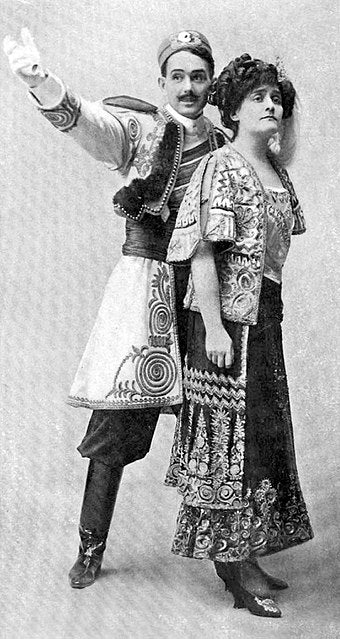The Merry Widow - The Greatest Operetta Work by Franz Lehár
“The Merry Widow,” based on Henri Meilhac’s comedy play titled “The Embassy Attaché” is Franz Lehár’s greatest work and its stature as one of the most enduringly successful operettas remains intact. Leo Stein and Viktor Léon worked as the librettists on this sparkling comedy that also depicts love through elegant music, memorable settings, and pleasant characters.

Origin
It all started after the premiere of “The Embassy Attaché,” which received successive productions and was also adapted in German. In 1905, Leo Stein was in attendance at one of the performances and initiated the idea of transforming it into an operetta. He collaborated with Viktor Léon to update the plot to contemporary Paris and contacted Richard Heuberger to work as the composer. However, Richard’s score was unsatisfactory, and he had to part ways. Franz Lehár’s name was suggested as he had already worked with Stein and Léon, and Lehár delivered emphatically. His number “Dummer, dummer Reitersmann” won over the duo and the entire score was completed within months. The operetta faced one last hiccup when the theatre lost confidence in Lehár’s compositions and asked him to walk away, which the Austro-Hungarian refused.

Performances and Adaptations in Popular Culture
In December 1905, “The Merry Widow” premiered at the Theater an der Wien in the Austrian capital of Vienna. The initial performances received some wobbly reactions, but it went on to become a huge success. It also received rave reviews critically and ran for 483 performances. In 1906, the production toured the whole country. In 1907, the first productions were held in South America, with Buenos Aires theatres playing at least five performances, all in different languages. Soon, productions were held all across Europe in Madrid, Moscow, Milan, Copenhagen, and Stockholm. The operetta crossed the Thames in June 1907, premiering at the Daly's Theatre in London. Basil Hood and Adrian Ross were responsible for the English libretto, the production became an instant sensation and ran for a record 778 days. In the same year, Broadway opened the doors for the first American production, which was held at the New Amsterdam Theatre. The production went on for 416 performances. In 1908, “The Merry Widow” traveled Down Under to Australia. In 1909, Paris held the French premiere of the operetta, now titled “La Veuve joyeuse,” at the Théâtre Apollo. The Italian version was titled “La Vedova Allegra.”
After 1910, opera has been frequently staged in English. In 1923, an English production was revived at the West End Theatre in London, running for a successive 239 performances. It was further revived down the line in 1924 and 1943, with the latter sustaining 302 performances. Several movies over the years have utilized the central plot of “The Merry Widow.”

- In 1918, Michael Curtiz created a silent version of the operetta.
- In 1925, Erich von Stroheim created his own silent film based on the operetta.
- In 1934, Ernst Lubitsch made a black-and-white movie starring Jeanette MacDonald, Maurice Chevalier, and Ernst Lubitsch.
- In 1952, a Technicolor version starred Fernando Lamas and Lana Turner.
-
In 1962, Werner Jacobs made an Austrian version of “The Merry Widow.”
The Play
Act I
A birthday ball is being held for the Grand Duke at the embassy in Paris. This Balkan principality of Pontevedro is facing grave financial difficulties and the provincial ambassador Baron Zeta, has a scheme to ensure Pontevedro doesn’t go bankrupt. Hanna Glawari, one of the guests at the party, has recently inherited a fortune from her late husband. Baron Zeta intends to marry her to the first secretary at the embassy, Count Danilo Danilovitsch, which will subsequently secure her wealth for Pontevedro. However, Danilo hasn’t arrived at the party yet, which propels Zeta to send for him.
Soon, Danilo arrived at the party and connected with Hanna. It appears that they were already a couple before Hanna got married. As Hanna wasn’t from an influential family, Danilo’s uncle had broken off their romance. The couple still feels for each other, but Danilo has no intentions of marrying her to acquire her fortune. On the other hand, Hanna will not court him unless she hears the three magical words, something Danilo states he will never do. Meanwhile, the Baron’s better half, Valencienne is seen flirting with Count Camille de Rosillon, the French Ambassador. Rosillon even writes “I love you” on her fan but his advances are rejected. Unfortunately, the fan is then lost and eventually found by Kromow, the Embassy Counselor. A jealous Kromow assumes the fan to be the property of his own wife Olga and submits it to Baron Zeta. The Baron fails to recognize it but decides to return the fan to Olga himself, rejecting repeated offers from Valencienne to do the same. As the Baron searches for Olga, he encounters Danilo and forgets about the fan. He again instructs him to tie the knot with Hanna. His offer is rejected again, as Danilo proposes a counter-offer of eliminating any foreign suitor who approaches Hanna.
Soon, Hanna is swarmed with advances before the “Ladies’ Choice” dance. Valencienne intervenes and tries to pair her with Camille, hoping to get rid of her own temptations. Meanwhile, Danilo has successfully convinced Baron Zeta with his plan and is seen roaming the ballroom, trying to divert the limelight from Hanna. However, Hanna Glawari chooses Danilo to be his dance partner. Danilo accepts the request but immediately announces a trade offer for the guests - anyone willing to pay ten thousand francs will get to take his place a win a dance with Hanna, and the proceeds will be donated to charity. However, this rebuffs the remaining suitors and Danilo is left alone with Hanna. An annoyed Hanna initially rejects Danilo’s request for a dance but is subsequently cajoled to join him on the floor.
Act II
The second act starts at a garden party at Hanna’s place, who is seen entertaining her guests by belting out the number “There lived a Vilja, a maid of the woods.” Meanwhile, Baron Zeta isn’t impressed by Camille’s approaches towards Hanna and instructs Danilo to discover the true identity of the fan he had recovered. He also correctly assumes that the fan belongs to Camille’s lover, one who is already married. They set up a meeting for later in the evening at the garden pavilion to discuss any findings, and also the plan to secure Hanna’s wealth for Pontevedro. Soon, Hanna notices the fan on Danilo’s hand and assumes it as an indication of his feelings towards her. Danilo, on the other hand, makes inquiries, uncovering several trails of infidelities that led back to the wives of multiple embassy employees.
The very same evening, Valencienne meets with Camille in the garden and indicates that they must go separate ways. They also find the fan which Danilo has involuntarily left behind. Camille wants it as a keepsake, to which Valencienne agrees, but only after writing “I’m a respectable wife” on it as a countermeasure. They decide to say their goodbyes privately, at the very same garden pavilion where Njegus (Danilo’s aide), Baron Zeta, and Danillo had planned their evening meeting. Njegus arrives first and spots Valencienne with Camille. He quickly beckons Hanna and makes her change places with Valencienne. Hannah and Camille emerge from the pavilion together and announce that they want to get married. This makes Danilo furious, as he narrates the story of a princess who cheated on her fiancee and storms off to Maxim's. Meanwhile, Baron Zeta and Valencienne are left visibly distraught, the former at the prospect of losing Hanna’s fortunes, while the latter yearns for Camille. Hanna realizes Danilo's jealousy and rejoices amid the scene of despair.
Act III
The act starts off at a theme party being held at Hanna’s place, which she has decorated to resemble Maxim's, Danilo’s favorite spot. Valencienne is dressed up as a grisette and is entertaining the guests. Danilo soon arrives and asks Hanna to cancel the marriage and save Pontevedro. Hanna responds that she was never engaged to Camille, but it was all an act to save the prestige of another married woman. Danilo is overwhelmed but dissuades himself from declaring his feelings for her. He reminds himself of his principles of not marrying for money. Soon, Njegus shows the fan to Baron Zeta, who finally recognizes it as Valencienne’s. He becomes enraged and vows to divorce her. He also plans to marry Hanna himself to save Pontevedro. However, Hanna declares that she cannot remarry, or she will lose her fortune. Danilo, upon hearing this, proposes to her. Hanna joyously accepts and further declares that she will only lose the fortune as it will be transferred to her new husband. Meanwhile, Valencienne picks up the fan and shows her reply (“I’m a respectable wife”) to Baron Zeta, who finally calms down and they reconcile. Everything ends happily.
The Queen of Operettas
The original version of “The Merry Widow” didn’t have an overture, which was later incorporated by the composer himself on its 400th performance. However, modern productions prefer the short introduction and rarely use the overture. The only instance of the overture being used was in 1942 when a special performance was held by The Vienna Philharmonic for the 70th birth anniversary of Franz Lehár.
“The Merry Widow” was also the first of its kind that was successfully commercialized. The USA tour heavily capitalized on its success, selling themed chocolates, corsets, and other items related to the production. The Merry Widow's hat became particularly famous, trending in Broadway and later adopted by the opera community as a fashion icon.
“The Merry Widow” features some of Frank Lehár’s masterpieces - “Merry Widow Waltz,’ and “You’ll Find Me at Maxim’s” are particularly famous and lauded for their seductiveness and panache. Lehár’s comedy is somewhat erotic and sharp, as he confronts the centuries-old political high societies across Europe - where money reigns supreme, gender structures are manipulated, and the power is essentially configured among the diplomatic corps who get to decide the fate of nations.
Lehár’s music evokes the satisfying cologne of fresh paint, forever etched into the memory of the audience. It not only showcases the composer’s brilliant musical prowess but also offers everything we earn from good music - “The Merry Widow” is light, clear, and beautiful. The overture can be considered an elaborate medley that belongs more at a concert hall, but on the right hand, it can conjure magic. Lehár did conjure magic. He successfully intertwined Viennese's culture through the famous “Merry Widow Waltz,” which remains one of the most loved tunes in the history of operettas. His charming musical colors and virtuosity combined together to create a masterpiece, one that has surpassed the longevity test and evoked itself into a musical pedestal - The Queen of Operettas.
Resource Links:
- https://www.britannica.com/topic/The-Merry-Widow-operetta-by-Lehar
- https://www.metopera.org/user-information/synopses-archive/the-merry-widow
- https://www.operanorth.co.uk/news/the-merry-widow-in-a-nutshell/
- https://australianballet.com.au/synopsis/the-merry-widow
- https://en.wikipedia.org/wiki/The_Merry_Widow
Related piano sheet music:
- Classical music: Piano sheet music at multi-levels
- Music from operas: Piano solo sheet music at multi-levels
- Music from orchestral pieces: Piano solo sheet music at multi-levels
You may also like:
